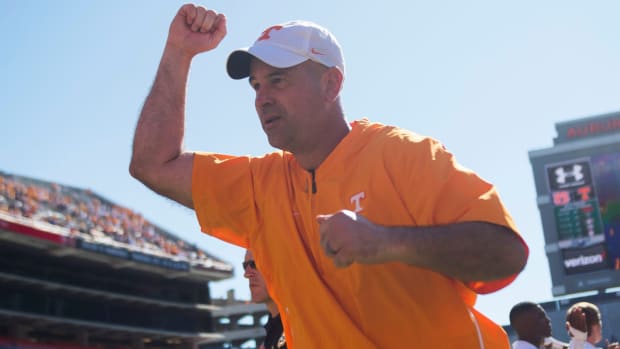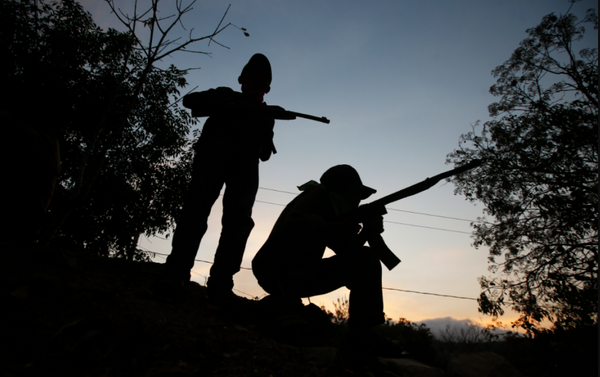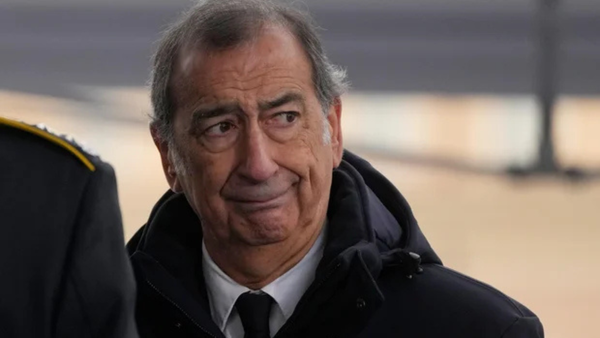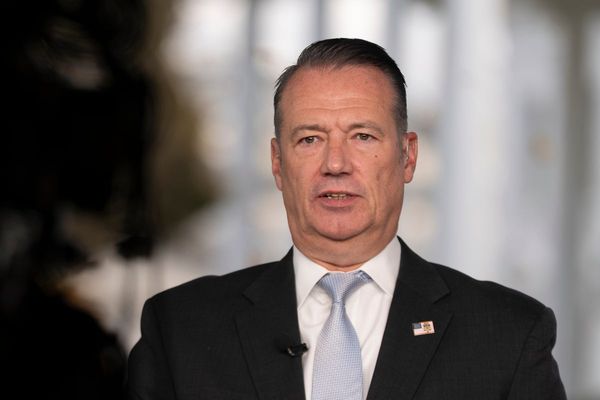Pour one out for Oklahoma State. The men’s basketball program at that school has earned a historic distinction—a dubious, thankless, unfair one. The Cowboys are the last high-profile team that earned a postseason ban from the NCAA for rules violations, and quite likely will be the last to serve that penalty.
That ban was handed down in June 2020, then upheld on appeal in ’21. Since then, all manner of renegades and con artists have had their day in NCAA infractions court and come away with something less than the ultimate sanction that was bestowed upon Oklahoma State. Times have changed, abruptly, and the Pokes had the misfortune of being on the wrong side of that shift.
The latest beneficiary of a kinder, gentler NCAA is Tennessee football. It was cited Friday by the association’s Committee on Infractions as having committed “hundreds” of violations in a case that it labeled “one of the worst the COI has seen.” The then head coach, Jeremy Pruitt, personally paid recruits and their families. Several former assistants and other staffers were involved in brazen violations as well. The Volunteers were a veritable rule-breaking factory, seemingly the only thing Pruitt was good at while going 16–19 in Knoxville.
The current NCAA penalty structure requires—not recommends, it requires—a postseason ban in this instance. Yet the COI deviated from established guidelines to avoid it. This is a sign of the times, which have changed even within the past five months.
Here is what COI chief hearing officer Kay Norton told Sports Illustrated in a February interview: “The postseason ban is a core penalty now, and indications we’ve heard are that it’s going to remain a core penalty, although maybe it’s only applied in the most egregious cases. But it is one of the more effective penalties in terms of punishment.”
Here is what Norton wrote in the hearing panel’s ruling on the case Friday: “This case came to the COI at a time of great change for the Association. Changes to the infractions process began roughly two years ago with the adoption of a new NCAA Constitution, which in relevant part states, ‘Divisional and, as appropriate, conference regulations must ensure to the greatest extent possible that penalties imposed for infractions do not punish programs or student-athletes not involved nor implicated in the infractions.’”
That’s a laudable sentiment. For decades, the NCAA has wrestled with finding a way to apply sanctions that appropriately punish those involved as opposed to those who came after the bad actors. In this case, the NCAA tried to find a different path to a significantly different—but fair—outcome.

Caitie McMekin/News Sentinel NFS via Imagn Content Services, LLC
The implicated adults were slammed: Pruitt got a six-year show-cause penalty and a full-season suspension for any school that wants to hire him within that window; other staffers were assessed sanctions that could keep them from coaching for several years; a booster was disassociated from the program for 10 years.
But the institutional penalty was a hit to the wallet instead of a punch to the gut. Fines were levied totaling about $9 million, a figure the COI said is commensurate with two seasons of lost Southeastern Conference postseason revenue shares for 2023 and ’24. Norton described that as a “punishment fits the crime” calculus. Tennessee can still go bowling, but it cannot profit directly from going bowling.
A $9 million hit is significant, even in the revenue-rich SEC. It is “exponentially larger” than the biggest fine the NCAA had previously administered, Norton said. But make no mistake, Tennessee would much rather fork over seven figures than not be able to play in the postseason the next two years—especially with an expanded, 12-team Playoff looming in 2024.
SEC commissioner Greg Sankey attended Tennessee’s COI hearing in April, and don’t underestimate the influence he might have had there. He’s a former COI chair himself, and he’s previously suggested that monetary penalties could be an alternative to postseason bans. Here is one that keeps a member of his conference in play for championships for the next two seasons.
The hope is that the $9 million is taken directly out of the football program’s budget instead of making Tennessee’s Olympic sports—or academic side—pay the price for a scofflaw organization with budget cuts in their areas. That hope is probably naive. Tell the rowing, soccer and swim teams it’s time to tighten the belts, because the football coaches were caught cheating.
Since Tennessee was lauded for its proactive and transparent work investigating its own mess, maybe the school will be similarly open about where its $9 million payment is coming from. (As for where the fine is going: the NCAA’s Student Assistance Fund, which provides financial support in case needs arise. Examples range from large-scale efforts such as funding furnishings after a natural disaster impacts a campus to mundane services like replacing a broken laptop.)
This ruling puts a bow on an embarrassing cycle for Tennessee, one in which the school somewhat inadvertently comes out of it much better than it went in. This all started with the misguided “fan mutiny” of 2017, when former athletic director John Currie’s attempt to hire Greg Schiano as football coach was undercut in a disingenuous populist revolt. That ultimately cost Currie his job.
The replacement AD was Phillip Fulmer, former football coach and administrative know-nothing. Fulmer got the bright idea to hire Pruitt from Nick Saban’s staff at Alabama, and it didn’t take long for that to turn into a failure on the field. But firing Pruitt without cause would have been expensive, and it was around that time that Tennessee fortuitously learned—egads—that there was cheating aplenty going on.
After an internal investigation uncovered a lot of dirt, the school had the ammo to fire Pruitt for cause and for free. It also had more than enough reason to shove Fulmer back into retirement and hire a real athletic director.
That turned out to be Danny White, who came from Central Florida and brought his football coach, Josh Heupel, with him. The result: a surprise 7–6 record his first year, then an 11–2 breakthrough last season. After getting both the AD and coach hires very wrong, Tennessee got them very right on the do-over.
And what many viewed as a cost-saving measure aimed at firing Pruitt cheaply turned into an unforeseen benefit: the internal investigation was deemed “exemplary cooperation” by the NCAA. Without that, a postseason ban would have been more seriously considered and perhaps applied.
Or so the Committee on Infractions said Friday. In reality, I suspect the last postseason ban has been given in big-time college sports. Luckless Oklahoma State got it, and has watched every sinner of the past three years skate away with something less.







